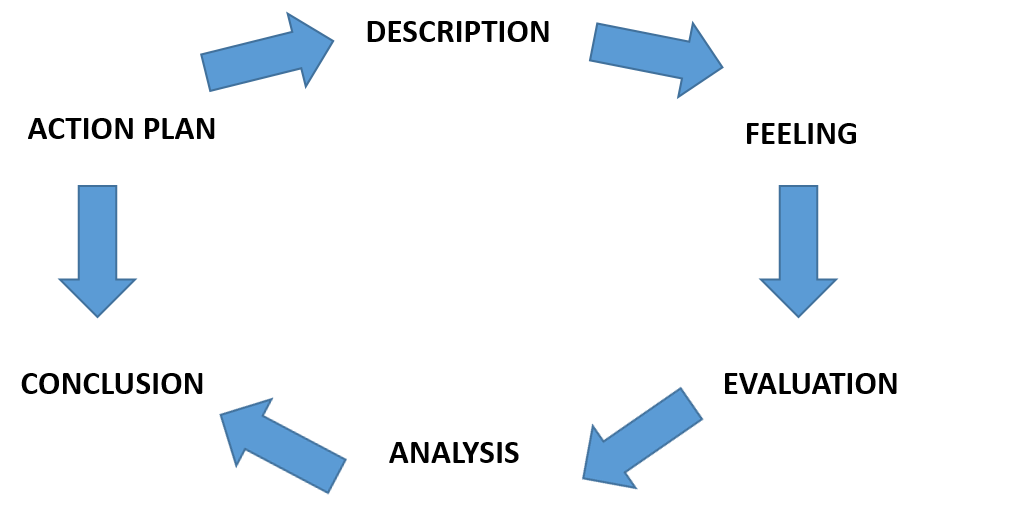PPI2015 Assignment Specifications
On this course you are expected to complete 4 assignments.
7. Individual project IV
7.2. Additional guidance continued
Reflective writing guidance
Reflection on your learning requires you to be self-aware in the critical examination of yourself and your feelings. You should be open about any difficulties you found in understanding the concepts and applying them in practice as well as candid about any disagreements you have with the idea of patient and public involvement in research. If you are enthused and inspired to change something in your practice, do discuss that.
A critical approach involves more than being self-critical: it includes positive reflections on your own strengths. In reflective writing, there is no right and wrong viewpoint. Whether your perceptions are positive or negative (or a mixture), it is important to be honest and you will not gain or lose marks by being for or against patient and public involvement or by struggling with the concepts and applicability to your own work, as long as you justify your stance. Your reflection should involve examining your feelings about the topic and its application in practice and critically evaluating your learning process. Gibbs’ (1988) model of reflection offers a structured approach to reflection which we recommend you use to guide your reflective assignment:
Gibbs’ (1988) Model of Reflection

[Page 10 and 11 in QMU’s Guide to reflection (at the bottom of the webpage here: http://www.qmu.ac.uk/eportfolio/reflect.htm) describes each stage in more detail.] When writing your narratives, try to think along the lines of Gibbs’ cycle of reflection and ask yourself the following questions at each of Gibbs’ 5 stages:
- Description: What theme are you discussing and what activities (e.g. lectures, tutorials, reading, discussions with other people, thinking about your workplace) are you referring to? Give a concise account.
- Feelings: What were you thinking and feeling about patient and public involvement at key points during the course? What was affecting your feelings? How do you feel now?
- Evaluation: This is the essence of IP IV. What was easy/difficult, challenging/inspiring? Why? What factors impacted on your understanding of patient and public involvement and how? How do you feel about the experience now?
- Analysis: What sense can you make of the experience?
- Conclusion: What have you learned? What is your experience of reflection throughout the course? How did reflection contribute to meeting the learning outcomes (or not)?
- Action Plan: This may not be relevant to all of you, but if you plan to undertake patient involvement activities, summarise briefly what more you need to know/do to make it work.
Make your writing explanatory, not descriptive, i.e. why, not just what. Remember, simply reviewing what happened does not constitute reflective writing. Reflection is the process of interrogating the experience with searching questions.
In the supporting appendix include extracts from your reflections throughout the course or posts to the Thought discussion boards.
Tips:
- This reflective writing assignment will take you longer than anticipated so please, please don’t leave it until the last minute. That said, it should be a rewarding experience to catalogue your development as a professional….
- It will help you greatly if you reflect as close to an event as possible rather than trying to remember how you felt 6 weeks later. You are therefore strongly encouraged to reflect regularly. Pebble+ records the dates of your entries and a few marks will be awarded in IP IV for timely and regular reflective entries
- Remember, you are given the opportunity to submit your reflections in Pebble+ to the course leader in week 4 so you can receive formative feedback on how you are approaching reflective writing.
References
- Gibbs, G (1988). Learning by doing. FEU publishers
- Available from http://www2.glos.ac.uk/gdn/gibbs/index.htm
- Excerpt from PDP paper 4, Reflection in higher education learning by J. Moon (2001)
- Available from Reflection in HE learning (PDF)
- Somerville, D., Keeling, J., A practical approach to promote reflective practice within nursing. Nursing Times. 2004 March 20;100(12).
- Available from A practical approach to reflection (PDF)
